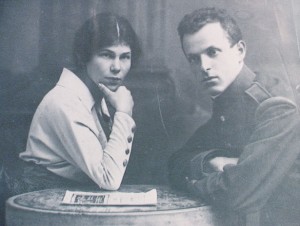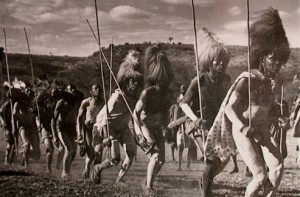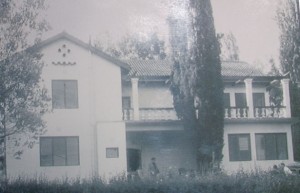About Kenny
By kennyA FAMILY ALBUM
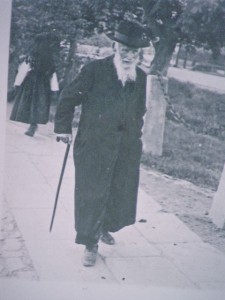
My mother’s grandfather, Salomon Jurgrau, owned a fabric shop in the town of Radautz, now on the northeastern border of Romania and the Ukraine. He married four times and fathered 18 children, one of whom was my grandmother, Emma. She was the first woman from Radautz to receive higher education than high school, and she earned a degree in English Literature at the University of Vienna. She married Jakob Shoenbaum, a handsome army officer, and soon after my mother Erica’s birth in 1917, they moved to Bucharest.
 In 1939, my father Igor walked out of his home town of Przemysl, Poland, just as Hitler’s armies arrived.
In 1939, my father Igor walked out of his home town of Przemysl, Poland, just as Hitler’s armies arrived.
With the help of underground collaborators, he found himself in Bucharest, where he was housed in a hostel that happened to be run by one of my mother’s girlfriends who must have thought that Igor was pretty cute. At the time, Erica had been engaged for seven years to a nice fellow called Zephy. She had been the only female student in Bucharest’s School of Architecture.
As both the Russians and the Germans made life for Jews extremely difficult, Erica and Zephy moved to Paris, where they thought they would be safe. Erica became an apprentice in an architectural studio. But it soon became apparent that Paris was no safer than anywhere else, and they decided to return to Bucharest.
One day, Erica received a phone call from Igor in his appalling German. “I hear that you have very beautiful legs,” he said. My mother hesitated for only a split second before replying, “Well, in that case, I suppose you had better come and check them out for yourself!” That was the end of the engagement to Zephy and the start of a 50-year marriage.
Igor opened a veterinary clinic in Bucharest. But after only a few months, it became clear that my parents would have to flee Europe. My father had many prominent clients whose pets he treated among them, the American Ambassador in Bucharest. One night, Papa received a phone call from this gentleman, warning him that he and Mama should leave within 12 hours because Hitler’s forces were marching towards Romania. The ambassador promised to send a car to pick up Erica and Igor and drop them off somewhere along the Danube, where a boat would take them across to Bulgaria and they could make their way from there to Istanbul and by ship to Israel.
Sure enough, at midnight that night, a car arrived. My mother was 23, my father 33. From Istanbul, they had hoped to immigrate to Brazil, but they could not get place on board a ship so they went to Israel, where they spent a year in a refugee camp. At this time, the British needed educated people for professional positions in their African colonies, so Papa was offered a job in a tiny outpost in Southern Rhodesia called Fort James.
Before long they found themselves on board a troop ship heading for southern Africa. My mother had always wanted to explore the “white patches” on the map of Africa that had still never been explored, so she was delighted. In 1942, after a year in a refugee camp in Fort James, Papa accepted a job as a meat inspector at Liebig’s Meat Factory at Athi River in Kenya, about 20 miles southeast of Nairobi, on the road to Mombasa. They settled in a tiny bungalow there and soon developed a thriving cattle farm.
Very few family members survived the Holocaust, but Mama’s mother Emma and her husband, Jakob, did. After Jakob’s early death of a stroke, Emma came out to Kenya to live with us. In those days, there were no direct flights. She traveled across the Mediterranean, up the Nile, and overland through Uganda and western Kenya to reach us in Athi River. The story goes that when she walked into my parents’ tiny government bungalow, her first question was: “Where is the chandelier?” Emma never lost her desire for bourgeois gentility. She hated Africa and in 1961, she left Kenya to live in Israel, where she died aged 92.
ON THE WAY TO AFRICA!
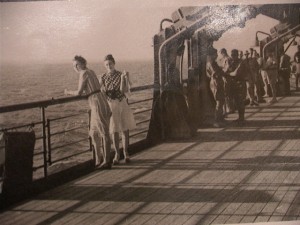
They don’t look like refugees, but here are Erica (right) and a friend on board the soldiers’ transport that took them from Israel to Southern Rhodesia in 1941.
My parents adapted to life in Africa as though born to the task.
Unlike British farmer settlers, who drove the “natives” off “their” lands, my parents worked with the Maasai, who are consummate cattle-keepers, to develop a hardy breed of cattle that could better withstand the harsh conditions of the plains. They also grew many fruit and vegetables and sold milk. My father became prosperous and it was into this world of freedom under the vast African skies that I was born in 1946.
In 1952, Papa took a job with the Department of Veterinary Services and Mama was employed as a Town Planner by the Kenya Lands Department. We moved to Nairobi, keeping the farm for another 10 years before it was sold. Papa became a renowned expert in parasitical diseases transmitted from animals to human beings. He worked for the Kenya Veterinary Services for many years before becoming a consultant for the World Health Organization.
He became famous in his field, and was invited all over the world to introduce his ideas on “human ecology” long before those terms became fashionable.
My mother, once considered among the most beautiful women in Paris when she was a student there in the 1930’s, was responsible for planning the many new settlements that dotted the Kenya countryside as the population grew.
Together, my parents were a very glamorous and charismatic couple and our house in Nairobi became the gathering point for travelers, professionals, scientists, artists, actors, famous people like Beryl Markham (the pilot), Joy and George Adamson (“Born Free”), Tom Mboya (Kenyan politician considered to be Africa’s “Kennedy” before he was assassinated), Buckminster Fuller (of the geodesic dome) and many others. Our house was the first to include Africans and Asians in our social gatherings, long before Kenya’s Independence in 1963 made this acceptable.
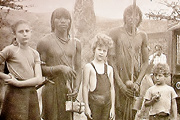
With Maasai friends on our farm at Athi River, ca. 1953. My sister Rhodia (left), myself (center), and our brother Oscar (right).
Far from feeling isolated in an African backwater, living in Nairobi, where I was exposed on a daily basis to European, African and Asian culture, gave me a global outlook on the world. My parents emphasized the importance of education, travel and participation in community affairs, and they refused to acknowledge the racial barriers that divided Kenya society at the time. Nairobi boasted an international, cosmopolitan population of aid workers, consular staff and settlers from almost every country in the world, and I had friends of all ages, nationalities and professions.
In 1968, after graduating from the University of Nairobi, I left Kenya for good. My family stayed there, and I return frequently to maintain connections and to breath the spicy scent of African soil. After two years in England and twelve years in Hamburg, Germany, I moved to the United States, where I now live in a small village on the East End of Long Island, NY. My daughter Sophie is now a model and actress, living in Los Angeles.
Click here for my full resume.
Sag Harbor,
NY
11963
US
Phone: 6464795884
Website: https://www.rafikiproductions.com/
Email: rafikiproductions@earthlink.net
